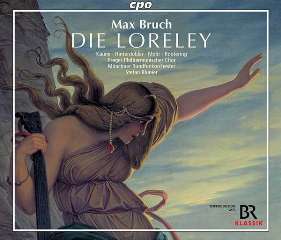Max Bruch - Die Loreley (2018)
Max Bruch - Die Loreley (2018)

Disk 1 1.Einleitung (1. Akt) 2.Nr. 1 Rezitativ und Arie 3.Nr. 2 Lied 4.Nr. 3 Rezitativ und Duett 5.Nr. 4 Ave Maria! 6.Nr. 5 Ensemble 7.Nr. 6 Rezitativ 8.Nr. 7 Lied der Winzerinnen 9.Nr. 8 Szene - Marsch, Chor und Ensemble 10.Nr. 9 Große Szene (2. Akt) Disk 2 1.Nr. 10 Chor und Duett (3. Akt) 2.Nr. 11 Rezitativ 3.Nr. 12 Lied 4.Nr. 13 Rezitativ und Ensemble 5.Nr. 14 Gesang der Loreley 6.Nr. 15 Ensemble 7.Nr. 16 Rezitativ und Kavatine 8.Nr. 17 Rezitativ 9.Nr. 18 Finale Disk 3 1.Nr. 19 Chor (4. Akt) 2.Nr. 20 Rezitativ 3.Nr. 21 Lied mit Chor 4.Nr. 22 Rezitativ (Hubert) 5.Nr. 23 Szene mit Chor 6.Nr. 24 Finale Michaela Kaune, Soprano - LENORE, Tochter des Fährmanns Hubert Magdalena Hinterdobler, Soprano - BERTHA, Gräfin von Stahleck und Nichte des Erzbischofs Danae Kontora, Soprano - WINZERIN Thomas Mohr, Tenor - PFALZGRAF OTTO Benedikt Eder, Baritonw - LEUPOLD, sein Seneschall Jan-Hendrik Rootering, Bassbaritone - REINALD, ein Minnesänger Thomas Hamberger, Bassbaritone - Der ERZBISCHOF von Mainz Sebastian Campione, Bass - HUBERT, Fährmann und Schenkwirt Prague Philharmonic Choir Münchner Rundfunkorchester Stefan Blunier - conductor
The Loreley is one of the most famous figures of the romantic era, and even today the massive rock in the Rhine is notorious for threatening the river’s skippers with shipwreck. The legendary female figure with her seductive beauty today no longer haunts the river, but her story continues to resonate in the imagination. In 1861, when he was a mere twenty years old, Max Bruch, a Rhinelander born in Cologne, devoted an opera to the Loreley, a work based on a libretto by the great Emanuel Geibel himself. This opera in four acts is only rarely performed and until now has never been recorded on CD. The Munich Radio Orchestra will now change this state of affairs: in a concert performance initiated by cpo the orchestra presented the work under the conductor Stefan Blunier, who was the General Music Director of the City of Bonn – that is, in the vicinity of the Loreley – when the recording was produced. The marvelous Michaela Kaune interpreted the title role in a top-quality performance, and Thomas Mohr was her male counterpart. Bruch set the Loreley story, in which everything, both in ambience and action, constituting a »Grand Romantic Opera« (thus the work’s subtitle) is present, in a highly romantic musical language. It is not without reason that Hans Pfitzner lent his support to this forgotten gem throughout his life. ---jpc.de
Emanuel Geibel’s libretto to Die Loreley is based on an invented saga dating from 1800 which claims a huge rock in the Rhine near Sankt Goarshausen – the site of many a nautical accident – as a physical embodiment of an enchanting female who threw herself into the river having been spurned. Her spirit remains in and around the rock, a perfectly rational explanation for the mysterious echoes that are still heard at the site by passing seamen.
Geibel’s text was intended for Mendelssohn, but ended up in the hands of that composer’s acolyte Max Bruch, who was in his early twenties when he wrote it (1860 63). We know Bruch was staunchly opposed to Wagner’s new language and its ‘deceptive cadences’. Sure, you can deride Wagner and worship Mendelssohn. But if you can’t conjure up any semblance of the magic that either composer was capable of then you have a theatrical and dramaturgical problem – certainly in a story as fantastical and melodramatic as this.
To a point Die Loreley is stodgy, formulaic and awkward, but it gets better as it proceeds. There is some character development in the titular Lenore’s graduation from lyricism to dramatic desperation to eventual transcendence but musical characterisation is shallow elsewhere. As the booklet notes point out, the libretto offers moments of dark romanticism that could have delivered scenes reminiscent of Robert le diable or Der Freischütz. Instead, the Grand Scene with Spirits resembles hand-shunted flat scenery in musical form (this is where Bruch might have benefited from one of those ‘deceptive cadences’). The multiple Vintner’s Choruses are foursquare, even if the Prague Philharmonic Choir do a better job at hiding their lack of enthusiasm than the Munich Radio Orchestra sometimes do elsewhere.
Yet there’s some fire in the piece and some beautiful singing on this rendition of it. Blunier handles the angry exchanges at the end of Act 3 with clarity and punch and then milks the final scene – the tenor Otto’s suicide into the Rhine following Lenore’s return-spurning of him – for all the transcendence Bruch tried to convey without recourse to Wagnerian sleight of hand. Michaela Kaune plots Lenore’s journey well but can be a little squeaky at the top of her register. Thomas Mohr’s Otto is eagerly sung in a well supported tenor. There is lovely depth and true control from Magdalena Hinterdobler’s Bertha – the aristocrat fiancé Otto is never really into – sung with soul and intimacy even at high volume. Jan-Hendrik Rootering is unsteady as Reinald despite the oak-cask timbre of his voice. Ultimately, none can paper over what’s missing in the music. There are scores by this composer that deserve more regular airings, but ‘Bruch and the Art of the Theatre’ is a thesis that will surely never be written. ---Andrew Mellor, gramophone.co.uk
download (mp3 @320 kbs):
yandex mediafire ulozto bayfiles








